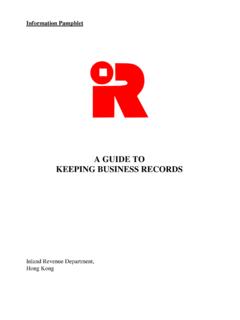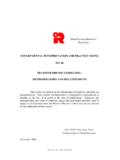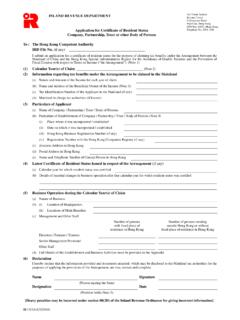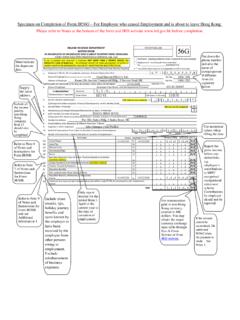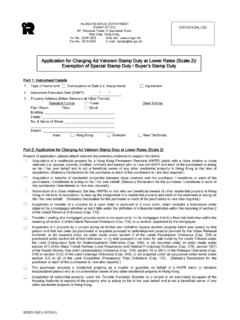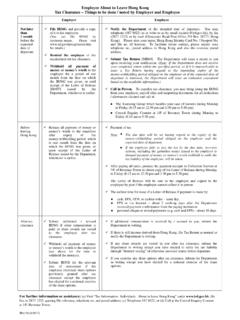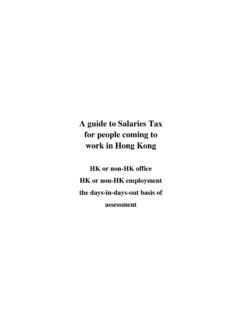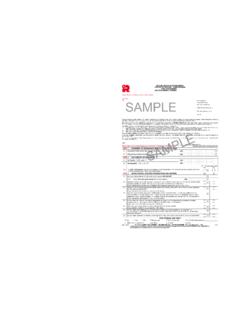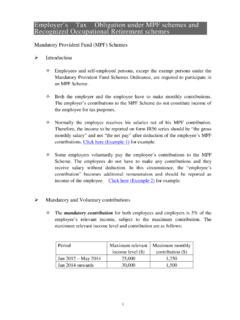Transcription of tax guide for charities - Inland Revenue Department
1 TAX guide FOR CHARITABLE INSTITUTIONS AND TRUSTS OF A PUBLIC CHARACTER Inland Revenue Department THE GOVERNMENT OF THE HONG KONG SPECIAL ADMINISTRATIVE REGION OF THE PEOPLE S REPUBLIC OF CHINA September 2021 Our website: TAX guide FOR CHARITABLE INSTITUTIONS AND TRUSTS OF A PUBLIC CHARACTER CONTENT Paragraph Introduction The Department s role 1 The guide 4 Meaning of Charity Charity is not equivalent to voluntary or non-profit-5 making organisation Charity must be established exclusively for charitable 6 purposes Charitable purposes are classified into four heads 7 Charity must be established for public benefit 10 Charity must act lawfully and has duty to safeguard 12 national security Constitution of Charity Governing instrument 16 Clauses in governing instrument 17 Taxation of Charity Tax exemption 20 Trading or business profits are taxable unless specified 21 conditions are fulfilled Trade or business not exercised in the course of the 23 actual carrying out of expressed objects Trading or
2 Carrying on business 24 Badges of trade 26 Indicia of carrying on business 27 Trading or non-trading transactions 29 Primary purpose trade/business or ancillary 32 trade/business Trades/businesses where work mainly carried out by 35 beneficiaries - 3 - Charging for services public benefit 36 Investee trading company not tax exempt 39 Financial investment 40 Programme related investment 44 Property letting 46 charities subject to Hong Kong s Jurisdiction charities qualify for tax exemption 50 Other Tax Advantages Inland Revenue Ordinance (Cap 112) 51 Stamp Duty Ordinance (Cap 117) 52 Business Registration Ordinance (Cap 310) 53 Approved Charitable Donations Definition of approved charitable donation 54 Donation receipts 58 To Check Whether an Organisation is a Tax-Exempt Charity List of tax-exempt charities 60 The Way a Charity is Recognised as a Tax-Exempt Charity Procedure 61 Review of Tax Exemption and Tax Obligations Duty to submit accounts and annual reports 65 Duty to inform change in circumstances 68 Duty to inform chargeability to tax 71 Duty to report remuneration paid to employees 74 Other Useful References Fund raising and anti-terrorist financing 75 Appendices 1 Purposes Held to be Charitable Purposes by the Courts 2 Clauses Generally Contained in a Charity s Governing Instrument 3 Clauses Generally Not Acceptable in a Charity s Governing Instrument TAX guide FOR CHARITABLE
3 INSTITUTIONS AND TRUSTS OF A PUBLIC CHARACTER INTRODUCTION The Department s role 1. Exemption of charitable institutions and trusts of a public character ( charities ) from tax is granted by the legislature. Section 88 of the Inland Revenue Ordinance (Cap 112) (the IRO) provides that a charity is exempt from profits tax subject to certain conditions to be fulfilled in relation to the trade or business carried on by the charity concerned. The Department s role is to ensure that tax exemption is provided to a charity as per the relevant IRO provisions. A charity may request the Department to recognise its tax exemption status accorded by section 88 of the IRO ( tax-exempt charity). 2. The Department is not responsible for the registration of charities nor does the Department have the statutory powers in the monitoring of their conducts.
4 To facilitate the general public to check whether donations to an organisation will be accepted as approved charitable donations for the purposes of the IRO, the Department , with the consent of the organisations concerned, publishes a list of charities that are exempt from tax under section 88 of the IRO, as explained in paragraph 60. It must be emphasised that the list does not constitute a formal register of charities . It should be apparent that the list does not include: (a) charities which do not seek for the recognition of status under section 88 of the IRO ( charities which do not require such recognition as they do not need to raise donations from the public); and (b) charities which do not give consent to the Department for publishing their names.
5 The Department s work strictly does not include the giving of advice regarding the setting up or running of charities . Legal advice, if required, should be sought from legal practitioners. 3. Section 88 of the IRO does not provide a legislative framework for regulating and monitoring charities operations or governance. The provisions therein primarily concern the exemption of tax liability of - 2 - charities . Where the Department considers, after taking a holistic view, that a charity s contravention of its charitable objects ( use of funds not in furtherance of the charity s charitable objects, serious breach of the charity s governing instrument, and engaging in or supporting any acts or activities which are unlawful or contrary to the interests of national security) would fundamentally change its charitable status, the Department may withdraw the recognition of tax exemption status of the charity concerned and raise tax assessment where appropriate.
6 The guide 4. This tax guide contains the interpretation and practice of the Department in relation to the taxation of charitable institutions or trusts of a public character and other related matters. It has no binding force and does not affect a person s right of objection or appeal to the Commissioner of Inland Revenue , the Board of Review or the Court. MEANING OF CHARITY Charity is not equivalent to voluntary or non-profit-making organisation 5. A voluntary or so-called non-profit-making organisation is not necessarily a charity, however worthy its causes may be. In fact, there is no provision in the IRO which exempts a voluntary or non-profit-making organisation from tax. Charity must be established exclusively for charitable purposes 6. The law of charity in Hong Kong has been built up by case law.
7 To be a charity at law, the institution or trust must be established for purposes which are exclusively charitable and these purposes of the organisation are charitable in the strict legal sense. Charitable purposes are classified into four heads 7. It has long been the practice of the courts in Hong Kong to refer to the Preamble to the Charitable Uses Act 1601 (commonly referred to as the Statute of Elizabeth I ) for guidance. The leading common law authority on the definition of charity, which is expressly applied by the courts in Hong Kong, is the famous dictum of Lord Macnaghten in the case of Commissioners for Special Purposes of Income Tax v Pemsel [1891] AC - 3 - 531. In that case, Lord Macnaghten listed four principal divisions of charitable purposes: (a) the relief of poverty; (b) the advancement of education; (c) the advancement of religion; and (d) other purposes of a charitable nature beneficial to the community not falling under any of the preceding heads.
8 8. While the purposes under the first three heads ( poverty, education and religion) may be in relation to activities carried on in any part of the world, those under head (d) will only be regarded as charitable if they are of benefit to the Hong Kong community. Examples of purposes held by the courts to be charitable are given in the list shown at Appendix 1. 9. The courts have considered various situations where charity status was claimed. Purposes held not to be charitable purposes include: (a) attainment of a political object ( such as furthering the interests of a particular political party, procuring changes in laws and procuring a reversal of government policy or of particular decisions of governmental authorities); (b) promotion of the benefits of the founders or subscribers; (c) encouragement of a particular sport such as football or cycling; (d) provision of a playing field, recreation ground or scholarship fund for employees of a particular company.
9 Charity must be established for public benefit 10. A purpose is not charitable unless it is for public benefit. The Department agrees with the interpretation of the Charity Commission of the UK that the public benefit requirement has two aspects: (a) the benefit aspect; and (b) the public aspect. The important points to consider when deciding whether an institution or trust s purposes meet the two aspects are set out in the following table: Public Benefit Important Points to Consider Requirement Benefit aspect There must be an identifiable benefit or benefits: (a) it must be clear what the benefits are; (b) the benefits must be related to the purposes; - 4 - (c) benefits must be balanced against any detriment or harm. Public aspect The benefit must be to the public in general, or to a sufficient section of the public: (a) the beneficiaries must be appropriate to the purposes; (b) where the benefit is to a section of the public, the opportunity to benefit must not be unreasonably restricted by geographical or other restrictions; (c) any personal benefit ( benefits that a person or organisation receives from a charity other than as a beneficiary) must be incidental.
10 11. An institution or trust cannot generally be charitable if it is in principle established for the benefit of specific individuals. It is, however, not possible to lay down any precise definition of what constitutes a sufficient section of the public. Each case must be considered on its own merit. As a general rule, the beneficiaries of a charity must not be defined by a personal connection like family relationship or common employer, as explained in Re Compton [1945] Ch 123 and Oppenheim v Tobacco Securities Trust Co Ltd [1951] AC 297. Charity must act lawfully and has duty to safeguard national security 12. A charity s resources must be directed towards charitable works and should not engage in or support any acts or activities which are unlawful or contrary to the interests of national security.
